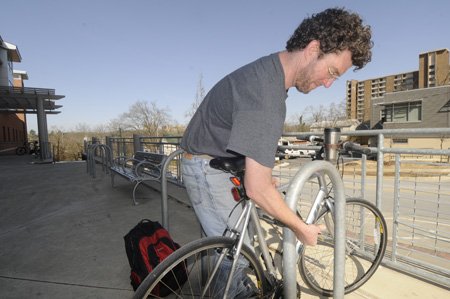FAYETTEVILLE — Reports of bicycle theft in Fayetteville have more than doubled since 2006.
City officials said the spike in crime could be linked with an increase in ridership.
“We’ve done a great deal in the last three or four years to make Fayetteville a more bicycle friendly community,” said Steve Clark, president of the Chamber of Commerce. “Any increase in bike theft is likely due to the fact that more people are riding bikes.”
Last year, the Fayetteville Police Department investigated 60 reports of bike theft. Police records reveal almost every case remains open and active.
“Typically, our recoveries come in the form of a lost and found report,” said Fayetteville Police Sgt. Bill Phelan. “When someone steals a bike, they usually take it from point A to Point B, before abandoning it on the road somewhere.”
Several years ago, Arsaga’s manager Daniel Estes said he never considered bike locks a necessity in Fayetteville
He often left his bike unchained whenever he rode to work, ran errands or went to friends’ houses.
It wasn’t until a brief trip to the grocery store three years ago, however, that Estes’ trust in the community would be shaken.
“I parked in front of Marvin’s IGA and went in for a brief moment to purchase some batteries for my bicycle lights,” he said. “In the time it took me to purchase the batteries and walk back outside, my bike had already been taken.”
Estes reported his bike stolen to the Fayetteville Police Department, but it was never recovered. It’s estimated value was $800.
“Looking back, I remember a truck being parked outside the grocery store and its bed being filled with bicycles,” he said. “Of course me being the trusting person I am, I made up an excuse for those bikes being in the truck. When I came back outside, my bike was gone and so was the truck.”
Today, Estes always checks his surroundings before leaving his bike unattended. In addition to locking his own bike, he reminds fellow cyclists to take the same precaution.
“I’ve always had a great sense of trust in the community, but unfortunately I learned my lesson the hard way,” he said.
Phelan said stolen bikes are handled like any other theft investigation. Officers record the incident, gather any evidence at the scene and follow up on new leads. Investigators also research trends to determine if a specific area if being targeted for bike theft.
Fayetteville Bicycle Company owner Barry Haley said the estimated value of an adult bike ranges from about $250 to $12,000 or more.
“From what I’ve heard, the majority of bike thefts are casual,” he said. “Usually, someone sees it sitting outside, they ride away on it and dump it in a ditch somewhere. Periodically, we have a theft ring that goes through campus, snipping locks. You might see 12 or 15 bikes disappear in a one or two-day period.”
Though most bike thieves are never caught, University of Arkansas Police Lt. Gary Crain said the department recently arrested two men accused of stealing 14 bikes on campus and selling them. Police recovered eight of the stolen bikes and the men were ordered to pay restitution.
“We solved about half our cases in 2009 with the arrest of those two suspects,” Crain said.
The American League of Bicyclists has yet to identify Fayetteville as a “Bicycle Friendly Community,” but the city has taken several steps aimed at earning the designation. In addition to nearly 16 miles of paved trailway, city officials have identified 129 miles for future trails. Bike lanes and safety crossings, along with lighted bike paths, are also part of the equation aimed at making Fayetteville bicycle friendly.
“We’re beginning to realize that biking is a part of Fayetteville’s lifestyle,” Clark said. “People are beginning to use bikes as a primary and secondary form of transportation. As our city grows, we have to keep thinking about our development in terms of being bike friendly.”
Elizabeth Kiker, vice president of the American League of Bicyclists, said structural improvement is only one component of bicycle friendly communities.
According to the organization’s Web site, communities must meet The Five Es: engineering, education, encouragement, enforcement and evaluation.
“Enforcement can be one of the trickiest requirements, but it’s also one of the most important,” she said. “It’s about enforcing the laws for road bicyclists and for motorists to create a sense of respect. It’s also about following through with traffic violations and theft reports.”
Phelan said the Police Department is doing all it can to help the city become more bicycle friendly.
“I know there are citizen groups and some of our motorcycle guys who patrol the trails periodically,” he said. “We don’t have full-time bike patrol due to manpower issues, but that’s definitely something we need to look at.”
Crain said the university is also doing its part to curb bike thefts by requiring bicycle owners on campus to register their serial numbers. The new policy was initiated last year by the parking and transit committee.
Estes said the university’s policy is a step in the right direction.
“Fayetteville, at the very least, should allow bike owners to register their bikes so they can have a record of ownership,” he said. “I think having that option would serve everyone. Unfortunately right now, it’s not something bicycle owners even have as an option.”
BY THE NUMBERS
Bicycle Thefts
The number of bicycles reported stolen in Fayetteville over the last four years:
• 2006: 26
• 2007: 33
• 2008: 42
• 2009: 60
Source: Staff Report

